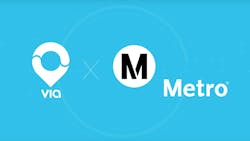L.A. Metro Board approves extension, expansion of rideshare pilot partnership with Via
The Los Angeles County Metropolitan Transportation Authority (Metro) will extend its rideshare pilot partnership with Via for another six months, following the L.A. Metro Board of Directors’ vote of approval.
L.A. Metro CEO Phillip Washington has the option to extend the pilot for another six months at his discretion. It also will allow for an expansion of the pilot’s hours in all three service zones and the addition of weekend service.
The pilot program is an experiment in bringing ride-hailing technology to low-income, disadvantaged riders and riders with disabilities who might not otherwise be able to access innovative mobility options to get to and from major transit centers.
The vote will provide $2.2 million for the first six months, with another $2.7 million if extended for an additional six months. The pilot was launched in January 2019, funded in part by a $1.35 million grant from the Federal Transit Administration for its Mobility on Demand Sandbox Demonstration program. The pilot came in more than $500,000 under budget in its first year, allowing that to be carried over to help fund the first six months of the extension.
That funding will allow L.A. Metro to extend service hours to 6:00 a.m. to midnight on weekdays and add weekend service from 8:00 a.m. to 10:00 p.m. in all three zones.
“Transit innovations should provide mobility solutions that are available to all riders, regardless of socioeconomic status, means or physical abilities,” said city of Inglewood Mayor and L.A. Metro Board Chair James Butts. “We’re excited to continue partnering to provide this innovative first- and last-mile option which opens up this kind of ride-sharing technology to riders who would not be able to access it otherwise.”
Since launching, the service has provided more than 70,000 rides and exceeded its key goals in terms of rides per week, rides per driver hour, wait times and customer satisfaction. More than 1,000 riders have used Via’s call-in center, indicating that people without smartphones are using the service. In addition, the service has provided more than 800 rides to passengers requiring special assistance or wheelchair accessibility at about a third of the cost to taxpayers of an Access Services ride.
“We are encouraged by the results so far of this innovative pilot project in offering ride-sharing technology to underserved communities,” said Washington. “We’ll continue to evaluate this pilot to make sure that it’s meeting our goals of providing high-quality mobility options for all while also taking vehicles off the road.”
About the pilot
L.A. Metro says this ride-hailing service was designed for those who have been excluded from using existing services. A goal of the partnership is to extend the benefits of on-demand services to a wider audience and to make it easier for riders to connect with a growing L.A. Metro system.
Riders create an account and hail a ride either through Via’s app or by calling Via’s call center. Via will accept payment by credit, debit or pre-paid card. These features allow passengers without smartphones or bank accounts to use the service. The call center has translation services available. Via’s service is also fully wheelchair accessible, with special vehicles able to easily accommodate those who are non-ambulatory.
Each ride must begin or end at pre-determined transit stations within the three zones. The cost to ride is free as they are considered a free transfer to a bus or rail line.
The three zones and associated stations are:
- L.A. Metro’s North Hollywood Station, Metrolink’s Burbank – Downtown Station and Metrolink’s Burbank Airport – South Station
- L.A. Metro’s El Monte Station and the Metrolink El Monte Station
- Avalon C Line (Green) Station, Willowbrook-Rosa Parks C Line (Green)/ A Line (Blue) Station, Long Beach Boulevard C Line (Green) Station, Compton A Line (Blue) Station and Artesia A Line (Blue) Station
Each ride with Via is shared, ensuring that L.A. Metro furthers the goals set out in its Vision 2028 Strategic Plan to reduce single-occupancy car trips. This partnership also provides valuable data on how riders use the service, which will help L.A. Metro measure the success of this partnership and help inform future innovations.
